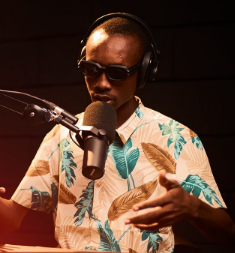From the bustling rap battle arenas of the University of Lagos to the growing Nigerian music scene, Richards Uchechukwu, better known as Wonder H, has steadily climbed the ranks. With his razor-sharp punchlines and lyrical dexterity, he’s captured the attention of fans and industry insiders alike. Beyond his rap prowess, Wonder H is a versatile artist who also lends his talents to songwriting and co-hosting the popular radio show, Lift Off with Twix. In this exclusive interview with The Entertainment Reporter, he shares insights into his musical journey.
Can you share how you started your journey into rap music? What were some of the key moments or influences that led you to pursue this career?
I started off as a miming in secondary school at Arch Deacon Adelaja Senior High School. My friends and I, including Jiggy Papi who is now Peruzzi’s manager, used to vibe during break times or when there were no teachers in class. We often got into trouble for disturbing the school, but eventually, I began writing my own songs. During that time, I met Id Cabasa while they were shooting the visuals for Olamide’s “Ẹni Duro.” I walked up to him and told him about my passion for music. He invited me to the studio, and that’s how I got inducted into the Codedtunes family until Olamide left with Pheelz, leading to Cabasa dissolving the label.
You’re known for your exceptional punchlines. How do you craft your lyrics to ensure they stand out and make an impact?
I learned from my godfather, Spacoman, that a creative should impact their listeners, either through education or entertainment. I read, listen, and pay attention to details a lot. I process everything that comes through my senses, which keeps me on my toes to constantly improve my craft.
You have won several rap competitions, which must have been significant milestones. How did these victories shape your career and influence your approach to music?
Winning those competitions made me work harder for larger audiences and major projects like the Hennessy Cypher. I’m known for saying that I don’t have competition in the industry—my only competition is me.
Do you think rap music is thriving or struggling in Nigeria right now? What changes or improvements would you like to see in the Nigerian rap scene?
I’m particularly not happy about the current situation. It hurts me to see rappers switching to dancehall just to go commercial, and it’s affecting the rap scene deeply. However, the turnout at the last event by Amazing Klef and Blaqbonez’s concert showed that rap still has a devoted community, and we can do better. We should uphold rap by resuming rap hangouts like the ones Lil Kesh, Viktoh, and I used to hold weekly in Bariga. Events like the MI & Vector beef session should have kept hip-hop going for the culture.
What is your biggest dream as a rapper? Looking ahead, what do you envision for your future in the music industry?
I envision myself as a voice like Busta Rhymes, Drake, and other rappers making waves on the international scene. I want to represent the culture globally.

